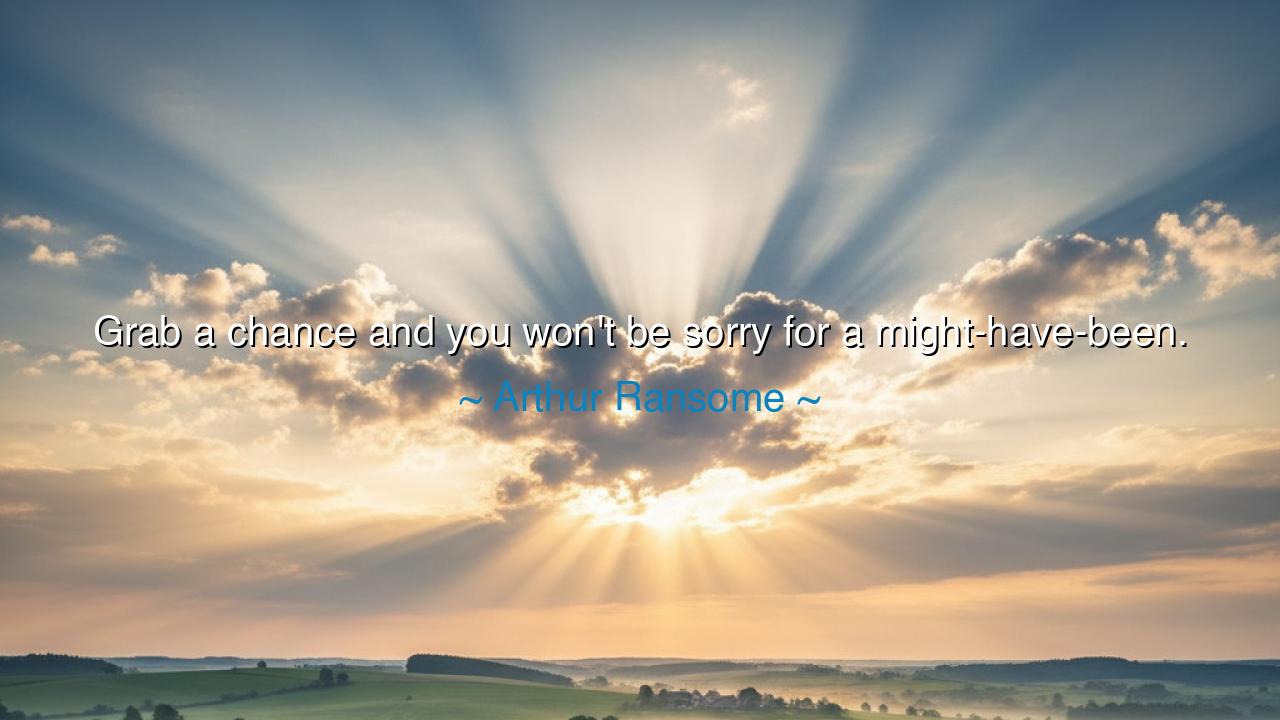
Grab a chance and you won't be sorry for a might-have-been.






"Grab a chance and you won't be sorry for a might-have-been." These words by Arthur Ransome capture the essence of seizing opportunity and the regret that comes from hesitation. Ransome speaks to a universal truth: that in the course of life, we are presented with moments that hold the potential for change, growth, and discovery. To hesitate, to wonder what could have been, is to allow the winds of chance to slip through our fingers. His words urge us to embrace the present, to act boldly, and to trust that in the pursuit of life’s opportunities, we find the true measure of our regret—not in what we failed to achieve, but in what we failed to attempt.
The ancients understood the power of action and the consequences of inaction. In the great epics of Homer, particularly in the Iliad and the Odyssey, heroes like Achilles and Odysseus faced momentous decisions where hesitation would have led to disaster. When Achilles was called to battle, he knew that the glory of war could cost him his life, but his desire for immortal fame propelled him forward. He grasped the chance to make his mark, understanding that the future he desired was not guaranteed by sitting idly, but by stepping forward into the fray. Similarly, Odysseus, through his endless trials, acted upon every chance for survival and return, proving that action, even when uncertain, is better than the regret of having done nothing.
Alexander the Great, too, embodied this idea of grasping the opportunity presented by the moment. When he set out to conquer the Persian Empire, he had no certainty of success, only the belief that fortune favors the bold. His willingness to seize the chance to create an empire that stretched across three continents was a manifestation of Ransome’s wisdom. Had Alexander hesitated, had he second-guessed the opportunities before him, his name might not have echoed through history. The true essence of his legacy lies in his refusal to wonder what might have been, but in the decisive action he took in the face of uncertainty.
Ransome’s quote speaks to the powerful force of regret, a feeling that often arises when we allow opportunities to slip away. Thomas Edison, the brilliant inventor, offers a clear example of someone who constantly grabbed chances. In his relentless pursuit of invention, Edison failed more times than he succeeded. Yet, he famously said, "I have not failed. I've just found 10,000 ways that won't work." Edison’s willingness to embrace opportunities, even if they seemed fraught with failure, is a lesson that echoes Ransome’s call. Edison did not lament what could have been; he took action on every idea, knowing that failure was only a step on the path to eventual success. It was his boldness in action that shaped the future.
In modern times, we can find similar stories of individuals who chose to seize the moment rather than be haunted by the “might-have-beens.” Consider Steve Jobs, the co-founder of Apple, whose decision to drop out of college and follow his intuition led to one of the most influential technology companies in the world. Jobs did not wonder about what he could have accomplished with a traditional career path. Instead, he chose to follow the chance presented to him, understanding that the opportunity to shape the future was too valuable to ignore. In his famous Stanford University commencement speech, Jobs spoke of connecting the dots of his life’s experiences—he understood that each chance he took, no matter how uncertain, brought him closer to his vision.
The lesson embedded in Ransome’s quote is clear: opportunity is not something to wait for, but something to seize when it arrives. Regret often comes not from failure but from not taking the opportunity when it is presented. In life, there are no guarantees, no clear paths, but there is always the possibility of growth through action. Hesitation may lead to regret, while action—whether it leads to triumph or failure—ensures that we experience life fully, without the haunting question of what might have been.
To apply this wisdom in our own lives, we must cultivate the courage to act when opportunity presents itself. Whether it’s a career change, a new relationship, or a creative venture, we must embrace the moment with a bold heart. Life will always be uncertain, and fear of failure is natural, but it is through action that we learn, grow, and shape our own destinies. We must remind ourselves that inaction, not failure, is the true path to regret. Let us choose the path of boldness, knowing that each opportunity grasped is a step towards a future we can call our own, without the weight of “might-have-beens” to weigh us down.
In the end, Arthur Ransome’s words remind us that life is a series of choices, and it is in the act of choosing, of stepping forward into the unknown, that we find our true potential. The power of grabbing chances lies not in the certainty of success, but in the freedom of living without the burden of wondering what could have been. Fortune favors the bold, and in embracing action, we find the meaning of our lives not in what we avoid, but in what we dare to create. So let us live fully, seize each moment, and be unafraid of what may come, for it is in the grabbing of chance that we truly live.






AAdministratorAdministrator
Welcome, honored guests. Please leave a comment, we will respond soon